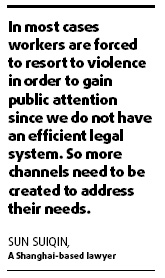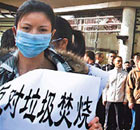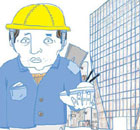Top Biz News
Workers angry over pay, toxic chemicals
By Qian Yanfeng (China Daily)
Updated: 2010-01-18 07:53
 |
Large Medium Small |
Angry employees who attacked a Taiwanese company in Suzhou, Jiangsu province over management and pay disputes last Friday said yesterday they were not satisfied with the local government's investigation into the case.
"The truth has been hidden from public view. There are people dying from long-term exposure to the toxicant used in the factory but no one is paying attention to that. There needs to be further investigation," a worker surnamed Zhu, who took part in Friday's gathering yet declined to give his full name, told China Daily yesterday.
He said at least four workers had died from overexposure to hexane, a toxic chemical workers had been asked to use for cleaning touch panels manufactured at United Win (China) Technology Ltd Co. The company is a subsidiary of Taiwan-based Wintek Corporation, one of the world's leading producers of small mobile phone panels and touch panels.
Local authorities, however, said at a press conference last Saturday that there had not been any deaths reported, and 47 people who showed symptoms of hexane poisoning had received due treatment.
Company executives and local officials were not available for comment yesterday.

More than 2,000 employees gathered at the factory located in Suzhou Industrial Park about 8:45 am Friday, and smashed vehicles and factory facilities despite explanations from management and local government officials. The workers also blocked a road and threw stones at police. No casualties were reported.
Media previously cited local authorities as saying workers had been provoked by rumors that the company planned to cancel a year-end bonus, which company executives later dismissed and promised to distribute before the Chinese Spring Festival that is less than a month away.
But Zhu said it was not just about the money. "What we feel angry about is the company authorities' apathy to our workers' health," he said.
He also said one of his colleagues, Li Liang, was one of the four victims, but the company told them Li had died of congenital heart disease.
"That was impossible because we never heard him having such a disease. It must have to do with the toxicant because there was a strong smell at the factory," he said.
Jiao Tan, Li's college roommate, also told China Daily that "Li was very healthy and never had any heart problem before."
Hexane is known to create extensive peripheral nervous system failure in humans. The initial symptoms are tingling and cramps in the arms and legs, followed by general muscular weakness. In severe cases, atrophy of the skeletal muscles is observed, along with a loss of coordination and problems of vision.
Zhu also complained of work overload and low pay at the factory, which he believed had driven many migrant workers like him to suffer from poor health and poverty.
"We had long been dissatisfied with the management, pay and even food provided by the company," he said.
"We had complained to the local government before, but nothing came out of that. There even seems to be an apparent rush from the government to try to play down the consequences after the protest broke out," he said.
| ||||
Sun Suiqin, a Shanghai-based lawyer, said an efficient channel on the government level for people to voice their complaints and grievances is lacking, which has given rise to growing public discontent and protests.
"In most cases workers are forced to resort to violence in order to gain public attention since we do not have an efficient legal system. So more channels need to be created to address their needs," he said.













